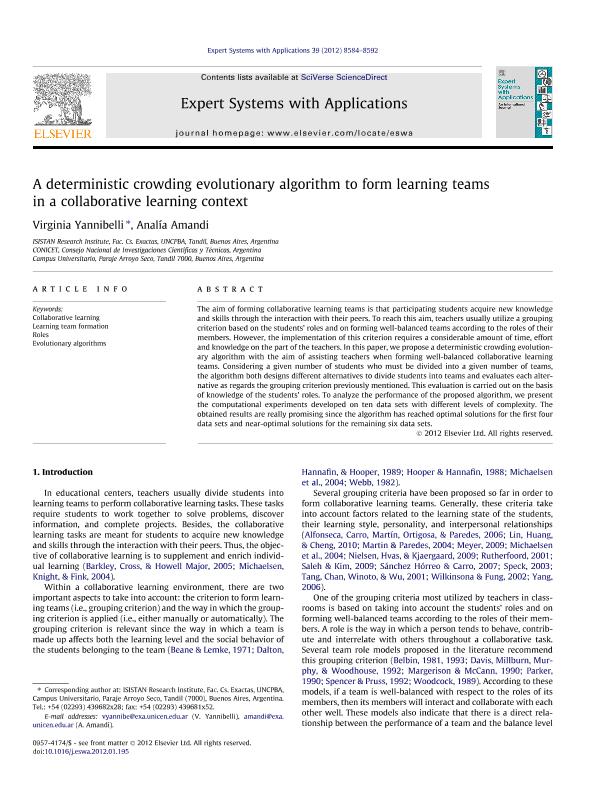Artículo
A deterministic crowding evolutionary algorithm to form learning teams in a collaborative learning context
Fecha de publicación:
08/2012
Editorial:
Pergamon-Elsevier Science Ltd
Revista:
Expert Systems with Applications
ISSN:
0957-4174
Idioma:
Inglés
Tipo de recurso:
Artículo publicado
Clasificación temática:
Resumen
The aim of forming collaborative learning teams is that participating students acquire new knowledge and skills through the interaction with their peers. To reach this aim, teachers usually utilize a grouping criterion based on the students' roles and on forming well-balanced teams according to the roles of their members. However, the implementation of this criterion requires a considerable amount of time, effort and knowledge on the part of the teachers. In this paper, we propose a deterministic crowding evolutionary algorithm with the aim of assisting teachers when forming well-balanced collaborative learning teams. Considering a given number of students who must be divided into a given number of teams, the algorithm both designs different alternatives to divide students into teams and evaluates each alternative as regards the grouping criterion previously mentioned. This evaluation is carried out on the basis of knowledge of the students' roles. To analyze the performance of the proposed algorithm, we present the computational experiments developed on ten data sets with different levels of complexity. The obtained results are really promising since the algorithm has reached optimal solutions for the first four data sets and near-optimal solutions for the remaining six data sets.
Archivos asociados
Licencia
Identificadores
Colecciones
Articulos(CCT - TANDIL)
Articulos de CTRO CIENTIFICO TECNOLOGICO CONICET - TANDIL
Articulos de CTRO CIENTIFICO TECNOLOGICO CONICET - TANDIL
Articulos(ISISTAN)
Articulos de INSTITUTO SUPERIOR DE INGENIERIA DEL SOFTWARE
Articulos de INSTITUTO SUPERIOR DE INGENIERIA DEL SOFTWARE
Citación
Yannibelli, Virginia Daniela; Amandi, Analia Adriana; A deterministic crowding evolutionary algorithm to form learning teams in a collaborative learning context; Pergamon-Elsevier Science Ltd; Expert Systems with Applications; 39; 10; 8-2012; 8584-8592
Compartir
Altmétricas




